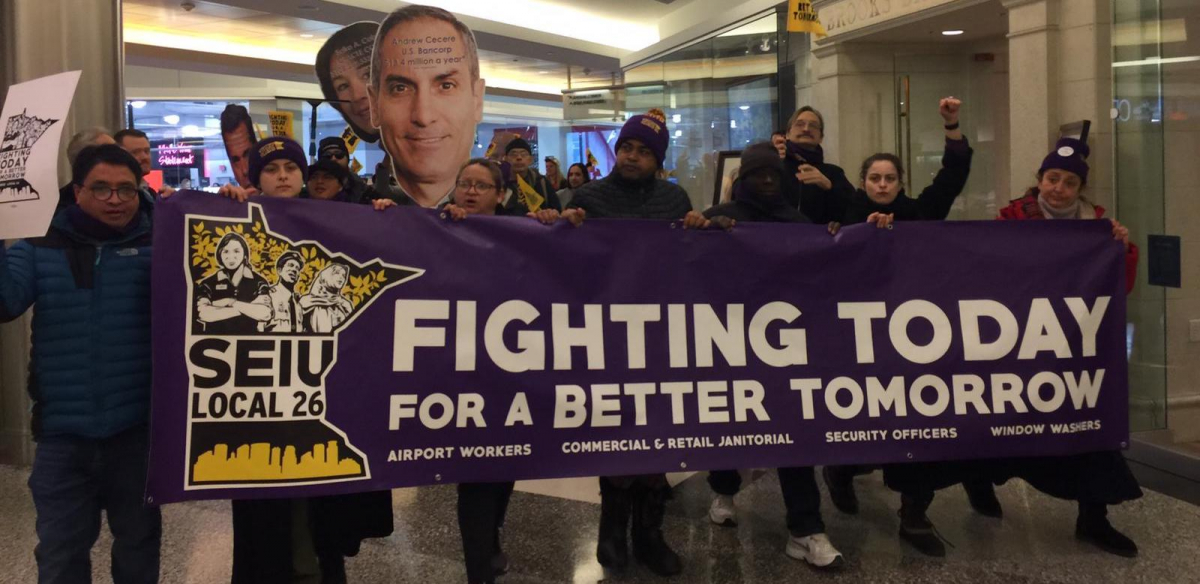Twin Cities Janitors and Guards Feature Climate and Housing in Their Strike Demands

Commercial office janitors, retail janitors, security officers, window cleaners, and airport workers marched through the downtown Minneapolis skyway in January as part of SEIU Local 26's contract campaign. Photo: SEIU Local 26
Update: Local 26 announced today that it will call a one-day strike next week by its 4,000 members who clean commercial office buildings. Earlier this week, the union reached a tentative agreement on a four-year contract covering 2,000 security officers, with raises of 14 percent.—Eds.
“Twin Cities janitors and security officers vote to authorize strike over pay and sick leave,” read the headline in the Minneapolis Star Tribune.
It’s true that those are among the workers’ top demands. But Service Employees (SEIU) Local 26’s fight is also for something bigger: affordable homes and a healthy planet for us all.
The union is demanding that companies negotiate over climate emissions and pay more to support affordable housing.
On February 8, 500 janitors, security officers, and their allies crowded into a warehouse space normally used for photo shoots. Banners lined the walls as people waved signs.
Local 26 has lined up every single one of its contracts, covering 8,000 workers, for this moment. Commercial office janitors, retail janitors, security officers, window cleaners, and airport workers are all fighting simultaneously.
The room was a rainbow coalition of immigrants from all over the world and people from every race and religion in the state. The union provided simultaneous interpretation into Spanish, Somali, Vietnamese, Amharic, and Nepalese. Chants in multiple languages filled the air.
Supporters from other unions and the city’s regional labor federation were there, along with a more unusual set of allies—representatives of the state’s environmental movement, including MN350 and young climate strikers.
A CURIOUS CONNECTION
I was there from the Sierra Club, where I work on the Beyond Coal Campaign, pushing to replace coal-fired power plants in the Dakotas with renewable energy.
As it turns out, there’s a curious connection between my campaign and Local 26’s, as outlined in a recent report called Sky High Pollution, released by the union and environmental allies.
The HERC garbage burner in downtown Minneapolis burns trash and uses the energy to heat downtown buildings—the same ones where janitors collect trash that ends up back at the burner. Pollutants from the burner blow to North Minneapolis, a predominantly Black neighborhood with already high rates of asthma, where many Local 26 members live.
The burner is managed by Great River Energy, which owns North Dakota’s biggest coal-fired power plant. The carbon dioxide emitted by this plant contributes to climate change, which has created climate refugees all over the world—some of whom end up in Minnesota as members of Local 26. One is Elsa Guamán, who cleans a building owned by the for-profit UnitedHealth Group.

SUPPORT LABOR NOTES
BECOME A MONTHLY DONOR
Give $10 a month or more and get our "Fight the Boss, Build the Union" T-shirt.
“I’m from Ecuador, and climate change affected people like me and our way of life—cultivating land—and as a consequence many of us have been obliged to immigrate for better jobs and opportunity,” Guamán told the crowd.
“I’m going to vote to strike today because we all deserve good jobs, but also because we need these companies to take responsibility for what they do to the planet, and to leave a healthy planet for our children and grandchildren.”
Janitors and security officers are demanding to close the HERC burner.
Members of Local 26 clean and protect the headquarters, commercial office buildings, and retail outlets of some of the biggest corporations in the world, including Cargill, UnitedHealth, U.S. Bank, Target, and Best Buy. The workers are calling for these companies to curb their carbon emissions.
They want their employers to create new janitorial positions to ensure that the buildings use safe cleaning chemicals, recycle and compost as much as possible (to reduce the amount of trash going to the HERC burner), and reduce greenhouse gas emissions. And they are asking building owners to join with union members and environmental allies to reduce the climate impact of downtown buildings.
HOUSING CO-OPS
These corporations earn billions in profit every year. So, yes—the janitors and security officers want their share.
The security officers have proposed a raise of $2 an hour each year; the employers countered with 81 cents spread over four years. The janitors want six days of paid sick leave; the employers say no.
“My grandfather bought a house on one union job,” said Romisha Jones, a Black security officer in downtown Minneapolis. “We should be able to do the same!”
With rent rising faster than wages, Minneapolis is facing a housing crisis. United Renters for Justice (Inquilinxs Unidxs por la Justicia), a renters’ rights organization that works closely with Local 26, has been organizing tenants to gain control over the buildings where they live and create housing cooperatives.
Local 26 has also partnered with housing organizations to demand that the biggest corporations in Minnesota—including Amazon, which has several big distribution centers and an office complex—put in more funds to build affordable housing.
Steve Payne is a campaign representative for the Sierra Club in Minnesota and a former organizer with SEIU Local 26.





